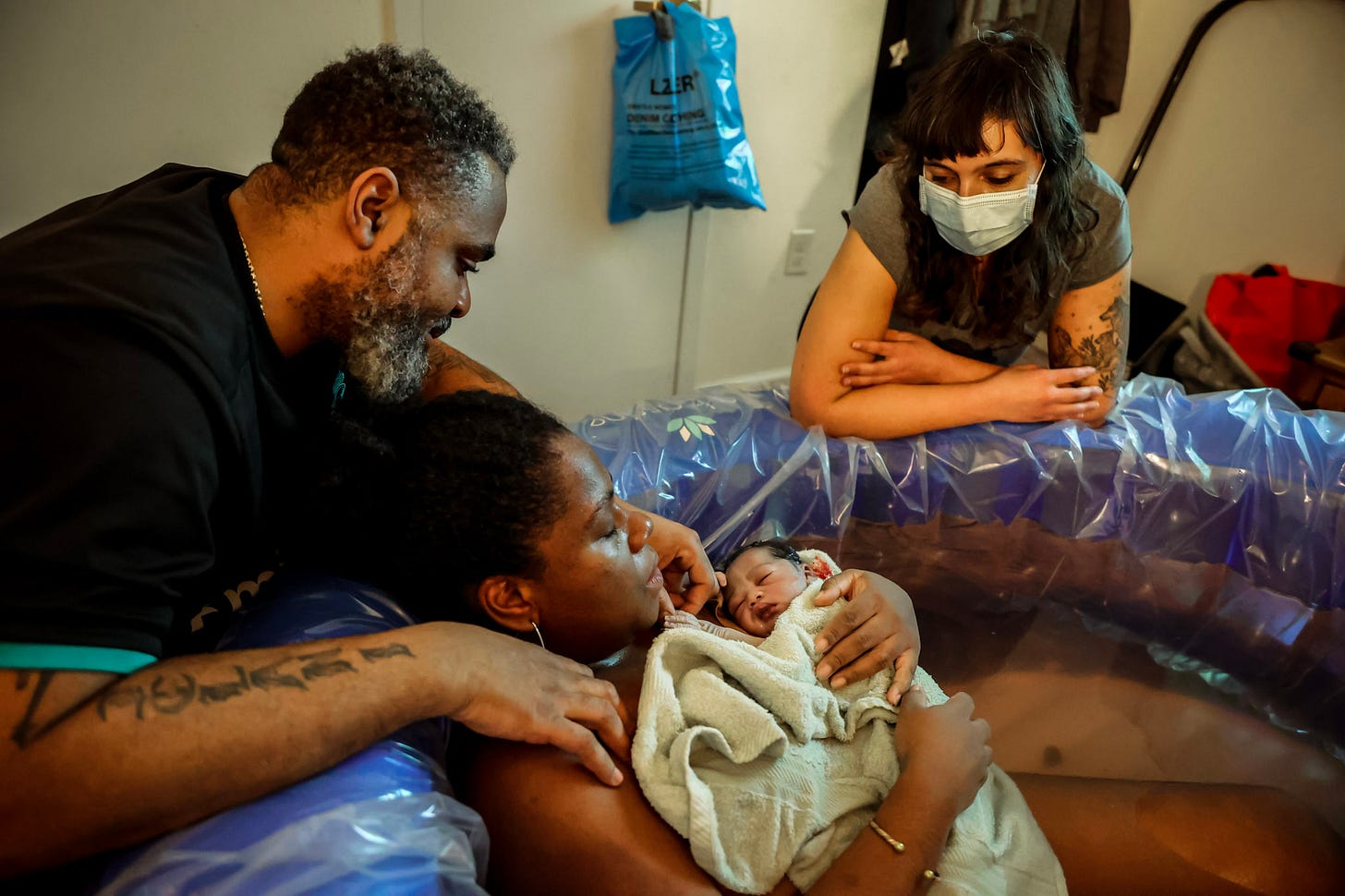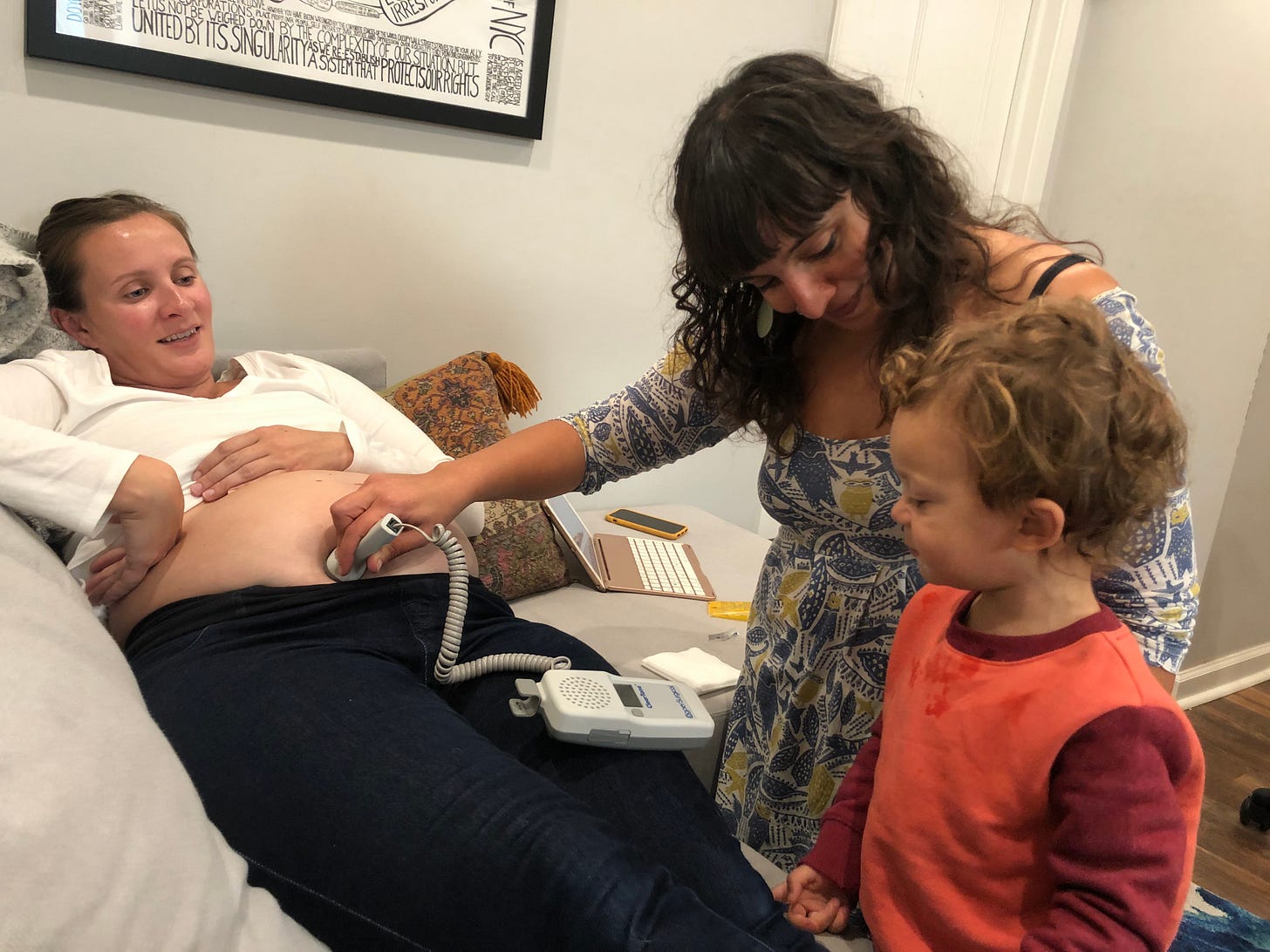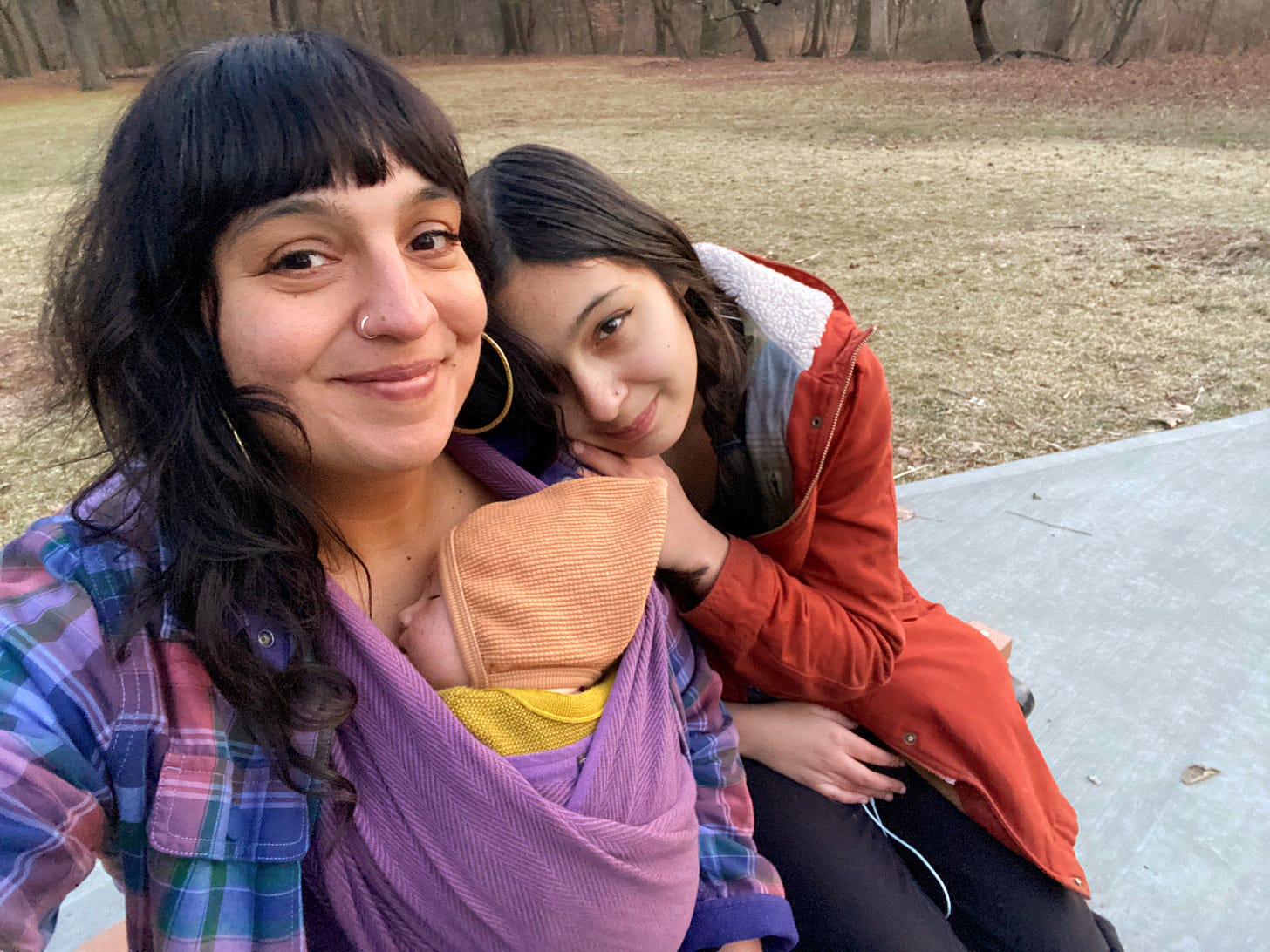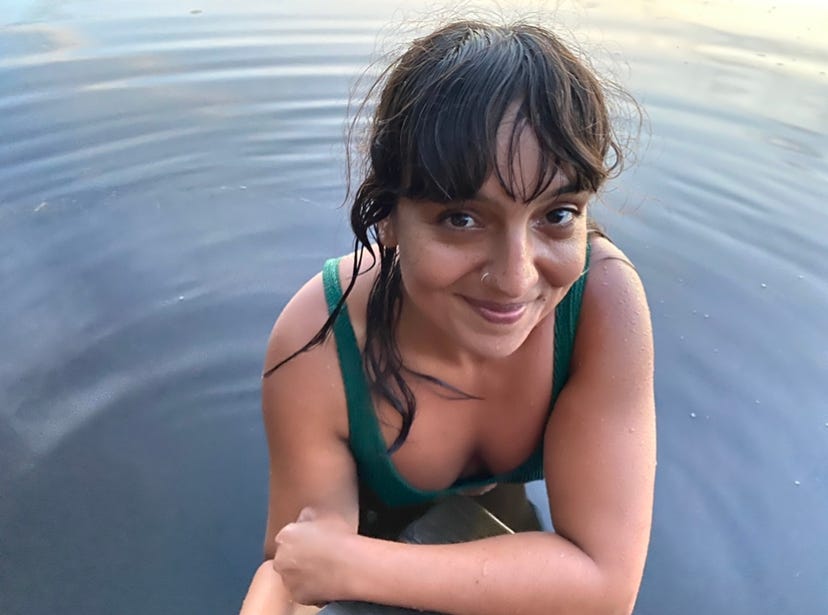Hi, I’m Robina. I’ll probably make you cry.
I’m also a Pakistani American licensed midwife, PhD, and unschooling mother of 4. My newsletter, Small Things Growing bridges a decade of clinical midwifery experience, a background in academic research, a dedication to social justice, a good sense of humor, and a big wide open tender heart to help you cut through the noise around birth and parenting, to trust your intuition in both, and to imagine liberatory futures. My writing tries to compassionately (but unapologetically) encourage you to question what we’ve been taught about the processes of growing, birthing, and nurturing our children — and to question why we’ve been taught these things in the first place.
I’m so glad you’re here. Welcome.
If you already know you’re ready to subscribe, you can do so here, or scroll down to read about your options (including sliding scale, pay-it-forward, and founding member options for paid content).
Some of the themes you’ll encounter here:
Everything I write here is fundamentally rooted in the concept of “Everyday Abolition” - the idea that abolition is not simply about dismantling the systems and institutions that sustain police and the prison industrial complex but also about building systems of community care and support. Or as I say, dismantling the cop in everything we do.
Yes, even in — and especially in - birth work.
A lot of birth influencers on social media speak in controversial, authoritative absolutes. As someone who has clinical experience in both hospital and home settings, to me this usually means they don’t *actually* have a ton of lived clinical experience. The truth is, the longer you do this work, the more humble you become.
All of the writing I do here is informed by both attending births in the Medical Industrial Complex and unlearning everything I thought I understood there at the feet of those doing the birthing in my private homebirth practice. Here are some things I can tell you right off the bat:
Birth is designed to work, and in most cases, works best the less you do to it (the myth of obstetrics saving women and babies from certain death is not actually as historically accurate as we like to believe);
Most people working within the MIC are not experts in birth, but experts in managing birth - which is not the same thing.
All people attending births in the United States — including obstetricians and midwives licensed by the system and “birth keepers” smugly satisfied by their opting out of it — have been colonized by a white supremacist, patriarchal, carceral, and capitalist paradigm of what birth is and what our responsibility to it and role in it is.
Small Things Growing exists to interrogate those paradigms. It also exists to affirm birthworkers in the physical and emotional tolls of our calling while also challenging us to critically interrogate our own practice.
Birth beyond Bon Iver and Fairy Lights
Birth is what I like to call extraordinary ordinary: it happens every day — in fact, it happens around 385,000 times every day — and yet the probability of any one specific person to be born is so low as to be virtually impossible. It is magic, it is miracle, it breathtakingly gorgeous, it is transformative, it makes any high you’ve ever experienced look like a depressive episode. I believe with my whole heart in its power for both birther and baby: do not think I’m exagerating when I say I believe that how we feel about our births, and how we are born, have radical potential to change the world.
But birth is also — literally — blood, sweat, and tears. It is hard AS FUCK. Every birthing person goes through a reckoning of whether or not they have the capacity to even survive it (they do) for a reason. I’m not here to sell you a version of birth that is sanitized and quiet and pain free. I don’t believe that the platonic ideal of birth is one in which a softly lit white woman in a lacy bralette breathes down her baby and then smiles through her tears afterwards. I don’t believe in “making it look easy” — that’s just a lie we’re sold to make us less troublesome. I believe the platonic ideal of birth is one that leaves you aware that you are exactly the imperfectly perfect powerhouse you need to be - and therefore more capable of parenting your specific child than any online sleep expert or multi-national corporation would have you believe — whatever it looks like to get there. I believe you have *everything you need to birth* already and am not interested in showing you how to take a calm cleansing breath or push with your knees pointed in (something I have never once seen a birth giver do intuitively but which the internets sure does love suggesting). Doing something you don’t believe you can do - even if it’s hard, even if it’s painful — has value. Roaring like the fucking badass you are as you build a whole human from scratch and then push them out of your body has value. No matter what your birth looks like IT HAS VALUE- because you do.
Parenting as relationship
I do not for one single second buy the idea our lives are over when we have children.
Can parenting be hard? Yes.
Can most relationships be hard at times? Also yes.
Our children are people and we are in relationship with them. I’ve seen over and over again as both a human and a midwife the singularly healing, fulfilling, and self actualizing potential of being a parent. There’s a lot of reasons why that’s not our usual cultural narrative around parenting, though, and Small Things Growing exists to explore some of them. I’m passionate about reclaiming a different narrative, one that rejects the idea that childhood is just preparation for being an adult and parenting is a mostly thankless investment. I really believe that most of what nurtures our children nurtures us too; it’s not only a relationship but a symbiotic one.
I believe there is no truly revolutionary or liberatory politic that does not acknowledge children as some of the most marginalized members of our society and does not reject domination as a cornerstone of our dealings with them.
(i.e. dismantling the cop in everything you do….)
I also just happen to think parenting is great: toddler patois is fucking hilarious, teens aren’t nearly as scary as we’re told to believe, and how else can you get the requisite 12 hugs a day for optimal mental health without 4 pairs of arms constantly clambering for yours?
Community as everything.
I believe in the connective, radical power of shared stories. One of the greatest losses of modern Western living is that industrial capitalism has fractured extended kin-networks (because a bunch of individual households is way more profitable than one big one where everything is shared; plus, people who lack intergenerational support will automatically look to systems and “experts” for wisdom, which is also profitable). This is devastating because we are all expected to do alone what it used to take an entire family to do; we lack day-to-day hands-on support. But it is also devastating because we lack the ability to really see, in any kind of true and intimate way, the lives of others. We assume everything is hardest for us because we don’t see it’s hard for everyone. We assume every family is happier, every parent is gentler, every couple is more connected. We don’t get to see the full spectrum of reality that other humans inhabit: that sometimes things are easy, that sometimes things are hard, that sometimes we’re resilient, that sometimes we’re not. We live lives of surface level knowing.
We need to know we’re not alone. But so many of us feel so alone.
I’ve spent a lot of time community building in my life and that is one of my goals for the work of this space, too. As I develop Small Things Growing, I hope to create more and more opportunities for people to connect and to share stories.
On subscriptions:
Small Things Growing consists of both free and subscriber-only content. Additionally, some posts will start off public but convert to paid content later. Your $5 a month (or $50 a year) allows me to do some of my best work, to write more robustly, and to share deep dives into research that takes me lots of time and effort. It’s a simple math equation: the more paid subscribers I have, the more time and energy I can devote here. I also happen to believe in people getting paid for their labor, particularly when they are in professions (like midwifery) that have historically been underpaid and undervalued. Paid subscriptions are a form of acknowledgment that you value my labor as a Brown woman, midwife, and mother. You can also further your vote of confidence as I launch this little space by becoming a founding member. Each tier of membership provides a different level of benefits; you can read about them on the subscription page.
Accessibility is incredibly important to me, however, and I understand not everyone can afford to be a paid subscriber. If you are a member of a historically marginalized/exploited group (Black, Indigenous, LGBTQIA+) who is facing financial hardship, if you’re making minimum wage, if you’re a single parent, if you’re a student or an adjunct: please reach out and I will add you, no questions asked. Those who have the means and/or are of identities that have profited off the exploitation of those communities might consider funding one of these additional subscriptions. You also have the option to gift one to someone in your life. Here are buttons to make all of these options easy breezy:
And if you’re still dying for more details about my background, I’ve got you:
My name is Robina Khalid and I’m a Pakistani-American community midwife, writer, and unschooling mother of 4 living in Lenapehoking/Brooklyn. I also happen to be a former academic who spent 8 years researching and teaching American Literature, Gender Studies, Black Studies, and Postcolonial Theory; a biracial, bisexual Muslim descended from an 11th century Sufi Saint; and a sexual abuse survivor who, like all survivors, is constantly learning and unlearning what that means.
I grew up with my feet on two continents, reading books on Brooklyn stoops and running through rainstorms on Lahore rooftops. As a young child in the 1980s, I used to think of myself as an alien, catching myself in the mirrors I passed and whispering the word. This was not precocious; I did not realize that “alien” was a term applied to humans, to signal their lack of belonging in the place they have found themselves, to classify them as other. I did not know yet what it meant to be othered, though I felt it constantly. I did not yet know words like marginalized. I just didn’t look like anyone else around me – I knew brown kids, and I knew white kids, but I knew no one who was both – and so I thought I looked like something from another planet.
I believed I was alienated and marginalized, sexually abused and “overly sensitive” because there was something inherently wrong with me. I did not know terms like white supremacy or colonization, just that even the picture books in my home in Lahore featured sylvan, pale girls with fair hair. But because reading was a safe refuge, I read, making my way down the long, low shelves of the Children’s section at the Brooklyn Public Library, into an elite private liberal arts college, and all the way through a doctoral degree (BA at Vassar College and PhD at the Graduate Center of the City University of New York, respectively). I read until I learned the words that explained the way I felt, and then I learned how to wield words as weapons against those feelings.
But somewhere along the way I started to push up against the limits of the theoretical. Giving birth – at home, autonomously, a choice that academic research had brought me to but whose glories it had in no way prepared me for – had returned me to the body I had erected words around as protection, and suddenly I was no longer satisfied with the world of the theoretical. I wanted to dig my palms into the mucky, beating heart of the world and fix it, not just talk about why it needed to be fixed.
So, with two children under 5 and pregnant with a third, I left academia to pursue midwifery (winning top honors for both highest GPA and clinical excellence when I received my MS in Midwifery at SUNY Downstate). As a midwife my work is about as real as it gets: I've held people's traumas and trembling bodies and breathed for babies who couldn't and been baptised in blood and amniotic fluid and shit. I’ve done this both in a public hospital and in my own home birth practice for just about a decade now. But while I left academia with the most idealistic view of midwifery, what I’ve learned is that the industrialization of birth — which includes modern midwifery — is complicit in all of the other oppressive forces and institutions in our lives and that divesting from that will be a lifelong process. I started my Instagram account @smallthingsgrowing to start to grapple with that, and after building a strong community there, launched Small Things Growing in 2023 to have the opportunity to write about these topics beyond 2200 character word limits — as much as I’ve enjoyed the ruthless editing skills I’ve had to hone while “microblogging” there.
I’ve been interviewed by the New York Times, New York Magazine’s the Cut, and Vogue Magazine about my midwifery practice and have been featured on the Economist and Birthful Podcasts. I’m currently writing a book, represented by Soumeya Bendimerad Roberts of HG Literary.
When I’m not writing I still delight in curling up with something to read or being in any body of water. But I find my deepest joys learning and traveling with my husband, Andy, and our children. There are ages 2-17: two boys and two girls, none of whom have been to school, all of whom were born at home, two of whom are amazing musicians that play five instruments between them, one of whom who will ask to build a fort and mean with plywood and a drill, and the last of whom is, in his own words, “just a little guy” who was born unassisted in the bathtub into me and Andy’s entwined arms.






